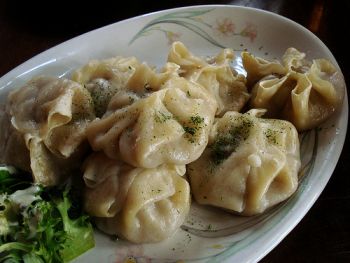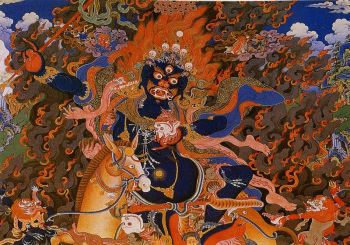Tsagaan Sar
Tsagaan Sar (in Mongolian white moon or white month) is the Mongolian lunisolar New Year festival. It is celebrated two months after the first new moon following the winter solstice. The start date depends on the longitude. In 2012 it was celebrated between the 22th and 25th of February. In 2013 the festival is going to be celebrated between the 11th and 13th of February.
Family meetings are organized in the home of the eldest family member. For the occasions, some Mongolians wear traditional clothes. People greet each other by saying “Amar mend uu?” (“Were you safe?”) or “Amar baina uu?” (“Were you peaceful?”). As sign of respect during greeting of elders, people grasp them by their elbows to show support. During greeting ceremony people hold long pieces of coloured cloth called “khadag.”
 Buuz
Buuz
Family meeting includes lot of traditional food like rice with curds (“tsagaa”), dairy products,“buuz” etc. Buuz are Mongolian steamed dumplings filled with minced mutton or beef meat. Cookies are served in the form of pyramid which symbolizes Mount Sumeru or Shambhala realm. People traditionally drink “airag” or “ayrag” which is a fermented horse milk. This family meeting is also opportunity for the exchange of gifts.
The day before Tsagaan Sar is a holiday too. It is called “Bituun” which is the name of the lunar phase of dark moon. On this day people clean their homes, barns etc. During special ceremony held on that day candles are lit at the altar symbolizing enlightenment of the samsara (“continuous flow”) and all sentient beings. Samsara is is the cycle of birth, life, death and rebirth in Hinduism, Buddhism, Bön, Jainism, Sikhism and some other traditional Asian religions.
 Palden Lhamo
Palden Lhamo
It is believed that on the Bituun Mongolian diety of Palden Lhamo visits people's homes. He arrives on horse who needs water. That is why people put 3 pieces of ice at the doorway. On the Bituun people eat some dairy products and buuz. The Bituun is an occasion when people settle their old arguments and debts.